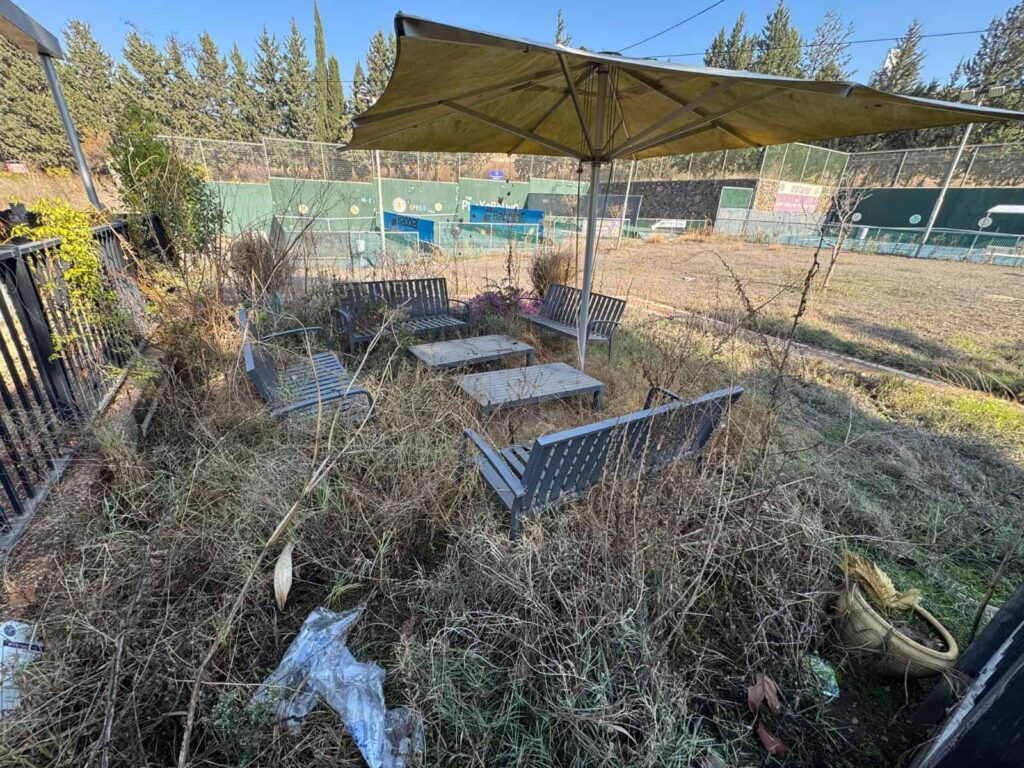Shrapnel is scattered across the premises, with fragments landing on tennis courts and causing deep cracks from explosions.

(Dec. 13, 2024 / JNS)
The management of the Israel Tennis and Education Center (ITEC) in Kiryat Shmona visited the site this week for the first time since Israel’s ceasefire with Iranian terror proxy Hezbollah in Lebanon, discovering significant damage caused by 14 months of war.
“It’s heartbreaking to see these photos from ITEC Kiryat Shmona,” said Wendy Slavin, president of the ITEC Foundation Board. “A tremendous restoration journey lies ahead, but our top priority is to move quickly and restore the center to be a safe haven for children. Our goal is to once again fill it with the joyful energy of children returning to their place of comfort, growth, and connection,” she added.
Shrapnel is scattered across the premises, with fragments landing on tennis courts and causing deep cracks from explosions. Broken fences, torn sunshades, and overgrown vegetation block access paths throughout the outdoor areas, while rocket damage has rendered several indoor courts unusable and shattered windows in many structures.
“This area has been a war zone, and seeing the center in its current state is heartbreaking—but also hopeful,” said Eyal Taoz, ITEC Global CEO. “We are fully motivated to act swiftly to restore the center as the jewel of Kiryat Shmona and to hear the sounds of children playing tennis once again,” he continued.

The Kiryat Shmona Tennis and Education Center was founded in October 1979 to serve the children of the Upper Galilee during years of heavy rocket attacks from Lebanon.
Nearly 1,000 children came weekly to learn and play tennis. School students attended tennis lessons during physical education classes, while in the evenings, adults played, including soldiers serving in the area or returning from extended missions in Lebanon. Even residents of Southern Lebanon crossed the border through “The Good Fence” (HaGader HaTova) to play at the center.
In November 2012, the center hosted its first international tennis competition, an ITF Junior tournament. For the first time in Israel, matches, including semi-finals and finals, were held indoors.
Around 70 players from Israel and abroad participated in the tournament. The onset of “Operation Pillar of Defense” led many international players to leave Israel at the time; however, about 10 players and their entourage defied the security situation and participated in the competition.
The restoration efforts are urgent as the community, which has been evacuated for over a year, is expected to return soon. The center will serve as a hub for community activities, providing support, shelter, and recreational opportunities for children and families in the area.
Special efforts are also being made to distribute scholarships to children evacuated from the area. These scholarships, totaling well over $100,000 through generous donations from North America, aim to provide young athletes with opportunities to continue their development despite the challenges posed by the conflict.
The northern center has produced tennis legends such as Dudi Sela, who reached a career-high ATP ranking of World No. 29.
